"Baruch Spinoza never made it to America, nor did he include it much in his philosophizing"
Van  Evan Haefeli, docent geschiedenis aan Columbia University, verscheen dit jaar deze studie:
Evan Haefeli, docent geschiedenis aan Columbia University, verscheen dit jaar deze studie:
Evan Haefeli, New Netherland and the Dutch Origins of American Religious Liberty. University of Pennsylvania Press, 2012
"The settlers of New Netherland were obligated to uphold religious toleration as a legal right by the Dutch Republic's founding document, the 1579 Union of Utrecht, which stated that "everyone shall remain free in religion and that no one may be persecuted or investigated because of religion." For early American historians this statement, unique in the world at its time, lies at the root of American pluralism.New Netherland and the Dutch Origins of American Religious Liberty offers a new reading of the way tolerance operated in colonial America. Using sources in several languages and looking at laws and ideas as well as their enforcement and resistance, Evan Haefeli shows that, although tolerance as a general principle was respected in the colony, there was a pronounced struggle against it in practice. Crucial to the fate of New Netherland were the changing religious and political dynamics within the English empire. In the end, Haefeli argues, the most crucial factor in laying the groundwork for religious tolerance in colonial America was less what the Dutch did than their loss of the region to the English at a moment when the English were unusually open to religious tolerance. This legacy, often overlooked, turns out to be critical to the history of American religious diversity."
Books.google geeft 3 hits voor Spinoza, 15 voor Plockhoy en 17 voor Van den Enden! Toch wordt over de invloed van Spinoza niets aangetoond. De auteur verwijst naar de boeken van Jonathan Israel en vat iets over de biografie van Spinoza samen. Spinoza wordt van p. 48 – 51 een paar maal genoemd, maar echte inhoudelijk inlichtingen over de connectie Spinoza – Amerika wordt niet geboden. Ook niet in een passage op p. 233 die ik hierna overneem en waaruit duidelijk blijkt dat die evidentie er nog niet is. Nee, het boek dat werkelijk die connectie op inhoudelijke gronden overtuigend laat zien moet nog verschijnen. Evan Haefeli schrijft in het 9e hoofdstuk "Radicalism":
“New Netherland was not the only Dutch society in North America. For almost a decade (1657-1664), the city of Amsterdam had a colony of its own on the South River [the Delawar River]. Technically a patroonship, a sort of fiefdom under the overall authority of the WIC, New Amstel inaugurated the most radical religious and social experiment the republic's colonies ever saw. While New Netherland clung to the legacy of the 1620s, New Amstel brought in the influences of the 1660s. The mix of radical religion, politics, and philosophy then available in the Dutch world could be called the Age of Spinoza, after the most famous and influential intellectual figure in the republic at the time. Baruch Spinoza never made it to America, nor did he include it much in his philosophizing. His influence was distant and indirect. Nevertheless, New Amstel's close connection to Amsterdam's city government opened up America to the republic's most progressive social visionaries, including men who knew Spinoza and his ideas.” (p. 233)


Reacties
Tot mijn genoegen staat mijn Engelse vertaling/uitgave van de VPS van Van den Enden ook in de literatuurlijst van dit boek. En is daar gebruik van gemaakt.
Wim Klever 07-12-2012 @ 22:50